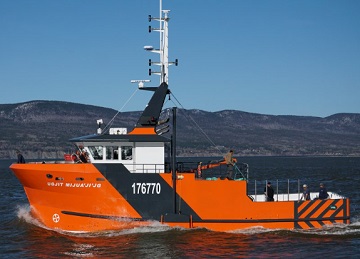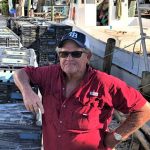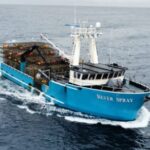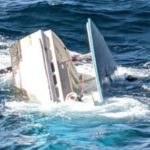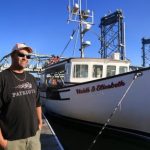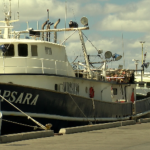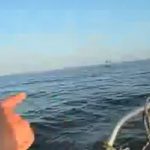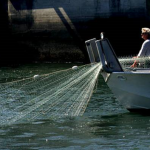Tag Archives: Quebec
More Vineyard Wind blades must be removed, repaired
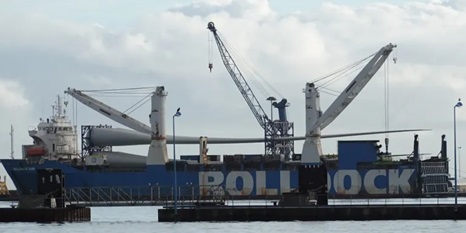 Vineyard Wind must remove an unknown number of blades that have already been installed south of Martha’s Vineyard while it repairs others, the company announced Wednesday. The project also received permission from the federal government this week to resume blade installation after it removes and repairs the components in the coming weeks. The latest announcement suggests investigations found more defective blades similar to the blade that failed in July and comes after the project quietly delivered at least four turbine blades from New Bedford to Cherbourg, France, where GE Vernova operates a blade manufacturing plant. >more, >>CLICK TO READ<< 11:48
Vineyard Wind must remove an unknown number of blades that have already been installed south of Martha’s Vineyard while it repairs others, the company announced Wednesday. The project also received permission from the federal government this week to resume blade installation after it removes and repairs the components in the coming weeks. The latest announcement suggests investigations found more defective blades similar to the blade that failed in July and comes after the project quietly delivered at least four turbine blades from New Bedford to Cherbourg, France, where GE Vernova operates a blade manufacturing plant. >more, >>CLICK TO READ<< 11:48
Commercial fishers demand stricter enforcement and penalties for illegal lobster sales – Federal and provincial governments need to step-up enforcement
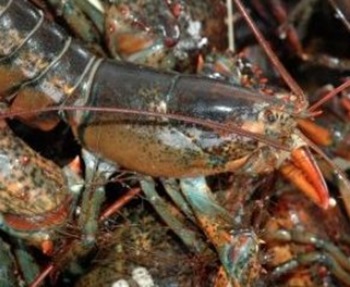 Uncertainty on the future of the commercial fishery will potentially put the sustainability of the lobster catch and jobs at risk according to the leaders of the Coalition of Atlantic and Quebec Fishing Organizations and the Unified Fisheries Conservation Alliance (UFCA). The upcoming meeting of fisheries ministers from across Canada is a unique opportunity to make sure the commercial fishery remains sustainable. Action is needed from both federal and provincial officials. For the Government of Canada, keeping independent enforcement officers on the water is critical to making sure no one fishes out of season. “Enforcing one set of rules for everyone is the key to a strong fishery. Impartial, independent enforcement officers at Department of Fisheries and Oceans is at the heart of a sustainable fishery,” according to Gordon Beaton, president of the Gulf Nova Scotia Fleet Planning Board. “We are concerned about potential changes to enforcement, we need more, not less, independent enforcement of the rules.” Science, not politics, should be driving decisions on the fishery. more, >>CLICK TO READ<< 17:40
Uncertainty on the future of the commercial fishery will potentially put the sustainability of the lobster catch and jobs at risk according to the leaders of the Coalition of Atlantic and Quebec Fishing Organizations and the Unified Fisheries Conservation Alliance (UFCA). The upcoming meeting of fisheries ministers from across Canada is a unique opportunity to make sure the commercial fishery remains sustainable. Action is needed from both federal and provincial officials. For the Government of Canada, keeping independent enforcement officers on the water is critical to making sure no one fishes out of season. “Enforcing one set of rules for everyone is the key to a strong fishery. Impartial, independent enforcement officers at Department of Fisheries and Oceans is at the heart of a sustainable fishery,” according to Gordon Beaton, president of the Gulf Nova Scotia Fleet Planning Board. “We are concerned about potential changes to enforcement, we need more, not less, independent enforcement of the rules.” Science, not politics, should be driving decisions on the fishery. more, >>CLICK TO READ<< 17:40
Trawler-Crabber For Gulf Of St Lawrence
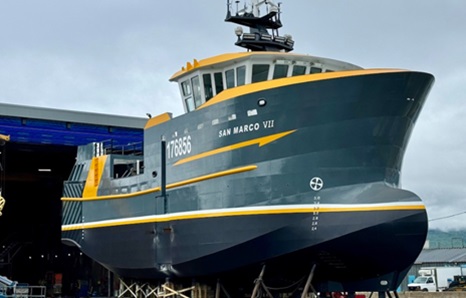 Gaspé shipbuilder Chantier Naval Forillon is about to deliver a new trawler/crabber designed by Navanex for Pêcheries Michel Turbide. The new San Marco VII measures 23.99 metres and is built in steel with an aluminium superstructure. It is expected to fish for redfish in the Gulf of St Lawrence, alternating this with fishing for snow crab during the season, with crab traps handled over the starboard side. more, >>CLICK TO READ<< 08:49
Gaspé shipbuilder Chantier Naval Forillon is about to deliver a new trawler/crabber designed by Navanex for Pêcheries Michel Turbide. The new San Marco VII measures 23.99 metres and is built in steel with an aluminium superstructure. It is expected to fish for redfish in the Gulf of St Lawrence, alternating this with fishing for snow crab during the season, with crab traps handled over the starboard side. more, >>CLICK TO READ<< 08:49
DFO drops investigations into alleged controlling agreements; inshore fisheries advocate calls for independent inquiry to find out why
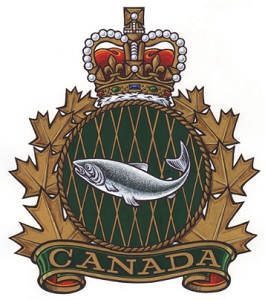 The federal Department of Fisheries and Oceans (DFO) has shut down three separate investigations in this province into alleged illegal controlling agreements that give processing companies control over inshore boats and quotas — including one case that included a harvester’s confession— with no charges laid. DFO officials have yet to say why the cases were closed last week, and whether controlling agreements remain illegal as a means to prevent the corporate takeover of inshore fisheries in Atlantic Canada and Quebec. DFO officials have yet to say why the cases were closed last week, and whether controlling agreements remain illegal as a means to prevent the corporate takeover of inshore fisheries in Atlantic Canada and Quebec. In a July 4th letter to Foss, Paul Didham with DFO’s Conservation and Protection division confirmed the department has decided “not to proceed in this matter.” “Therefore, please be advised that this investigation is now concluded, and no charges pursued.” more, >>CLICK TO READ<< 19:11
The federal Department of Fisheries and Oceans (DFO) has shut down three separate investigations in this province into alleged illegal controlling agreements that give processing companies control over inshore boats and quotas — including one case that included a harvester’s confession— with no charges laid. DFO officials have yet to say why the cases were closed last week, and whether controlling agreements remain illegal as a means to prevent the corporate takeover of inshore fisheries in Atlantic Canada and Quebec. DFO officials have yet to say why the cases were closed last week, and whether controlling agreements remain illegal as a means to prevent the corporate takeover of inshore fisheries in Atlantic Canada and Quebec. In a July 4th letter to Foss, Paul Didham with DFO’s Conservation and Protection division confirmed the department has decided “not to proceed in this matter.” “Therefore, please be advised that this investigation is now concluded, and no charges pursued.” more, >>CLICK TO READ<< 19:11
Minister to assess damage after 5 fishing boats destroyed by fire in Quebec’s Magdalen Islands
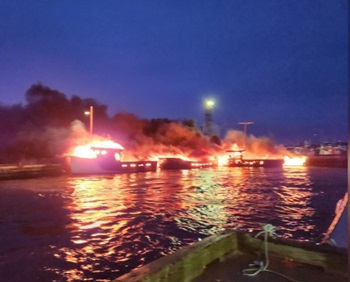 Federal fisheries minister Diane Lebouthillier was scheduled to visit the Magdalen Islands’ Grande-Entrée wharf Monday after five fishing boats were destroyed by a fire. The fire broke out one of the vessels Sunday morning and then spread to four others in the harbour. All but one of the boats sank, spilling an estimated 18 and 220 litres of hydrocarbons into the waters, according to the Canadian Coast Guard. Diane Lebouthillier, who is the MP for the area and is Canada’s Minister of Fisheries, Oceans and the Canadian Coast Guard, is set to arrive in the Port of Grande-Entrée Monday afternoon to assess the damage. She will be accompanied by Mayor Antonin Valiquette, who is also president of the Communauté maritime des Îles-de-la-Madeleine, and Cédric Arseneau, area director for the Magdalen Islands at Fisheries and Oceans Canada. video, more, >>CLICK TO READ<< 16:47
Federal fisheries minister Diane Lebouthillier was scheduled to visit the Magdalen Islands’ Grande-Entrée wharf Monday after five fishing boats were destroyed by a fire. The fire broke out one of the vessels Sunday morning and then spread to four others in the harbour. All but one of the boats sank, spilling an estimated 18 and 220 litres of hydrocarbons into the waters, according to the Canadian Coast Guard. Diane Lebouthillier, who is the MP for the area and is Canada’s Minister of Fisheries, Oceans and the Canadian Coast Guard, is set to arrive in the Port of Grande-Entrée Monday afternoon to assess the damage. She will be accompanied by Mayor Antonin Valiquette, who is also president of the Communauté maritime des Îles-de-la-Madeleine, and Cédric Arseneau, area director for the Magdalen Islands at Fisheries and Oceans Canada. video, more, >>CLICK TO READ<< 16:47
Fire destroys 5 fishing boats in Magdalen Islands, Quebec.
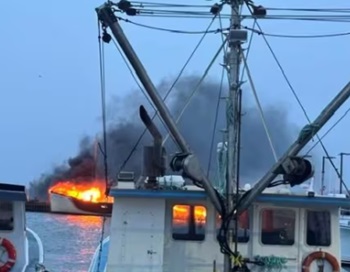 Five fishing boats were completely destroyed in a fire at the Magdalen Islands’ Grande-Entrée wharf Sunday morning. The fire department received a call around 4:20 a.m. about burning boats at the Magdalen Islands’ largest fishermen wharf. The fires were under control as of 7:30 a.m., though three boats sank, two others were burned to a crisp and others suffered minor damage, said Antonin Valiquette, the mayor of the Magdalen Islands. No one was injured. Valiquette says all evidence points to the fire being accidental. It appears to have started in one boat and been pushed onto other boats by the wind. more, >>CLICK TO READ<< 13:23
Five fishing boats were completely destroyed in a fire at the Magdalen Islands’ Grande-Entrée wharf Sunday morning. The fire department received a call around 4:20 a.m. about burning boats at the Magdalen Islands’ largest fishermen wharf. The fires were under control as of 7:30 a.m., though three boats sank, two others were burned to a crisp and others suffered minor damage, said Antonin Valiquette, the mayor of the Magdalen Islands. No one was injured. Valiquette says all evidence points to the fire being accidental. It appears to have started in one boat and been pushed onto other boats by the wind. more, >>CLICK TO READ<< 13:23
NL Harvesters Say Thanks For Nothing, Bait Fishery Slap in the Face to License Holders
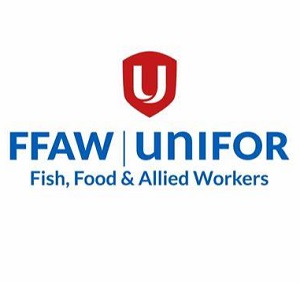 This morning, the federal government announced a bait fishery for Atlantic mackerel in Atlantic Canada and Quebec. A bait fishery for mackerel will do nothing for harvesters in Newfoundland and Labrador, and harvesters are demanding a modest directed commercial quota for the province. “Newfoundland and Labrador has a history of a fully monitored directed fishery that provided top quality product in a traditionally fall fishery. FFAW-Unifor’s proposal for a directed fishery with temporal coverage would bridge the existing information gaps,” says FFAW-Unifor Secretary-Treasurer Jason Spingle. “Moreover, today’s release is not clear what portion Newfoundland and Labrador harvesters would receive and when,” Spingle says. more, >>CLICK TO READ<< 13:36
This morning, the federal government announced a bait fishery for Atlantic mackerel in Atlantic Canada and Quebec. A bait fishery for mackerel will do nothing for harvesters in Newfoundland and Labrador, and harvesters are demanding a modest directed commercial quota for the province. “Newfoundland and Labrador has a history of a fully monitored directed fishery that provided top quality product in a traditionally fall fishery. FFAW-Unifor’s proposal for a directed fishery with temporal coverage would bridge the existing information gaps,” says FFAW-Unifor Secretary-Treasurer Jason Spingle. “Moreover, today’s release is not clear what portion Newfoundland and Labrador harvesters would receive and when,” Spingle says. more, >>CLICK TO READ<< 13:36
Lobster harvesters in Atlantic Canada to vote on increasing minimum legal size this year
 At stake is maintaining access to the United States market. “It will be an individual vote. That’s a big decision that every single enterprise and owner has to look at from their own business,” said Heather Mulock, executive director of the Coldwater Lobster Association, which represents fishermen in lobster fishing area 34 (LFA 34). In late May or June, the 979 licence holders in the area will be asked to vote on whether to match increases in allowable U.S. catch measurements that will come into effect Jan. 1, 2025, and again in 2027. Live Canadian lobster that fall under the new limits would not be allowed into the U.S. That includes bonded shipments of lobster under the new minimum in the U.S., according to an information package sent to fishermen in southwestern Nova Scotia. That could block trucking of “undersized” Canadian lobster across the border for flights to Asia from airports in Boston or New York. more, >>click to read<< 08: 57
At stake is maintaining access to the United States market. “It will be an individual vote. That’s a big decision that every single enterprise and owner has to look at from their own business,” said Heather Mulock, executive director of the Coldwater Lobster Association, which represents fishermen in lobster fishing area 34 (LFA 34). In late May or June, the 979 licence holders in the area will be asked to vote on whether to match increases in allowable U.S. catch measurements that will come into effect Jan. 1, 2025, and again in 2027. Live Canadian lobster that fall under the new limits would not be allowed into the U.S. That includes bonded shipments of lobster under the new minimum in the U.S., according to an information package sent to fishermen in southwestern Nova Scotia. That could block trucking of “undersized” Canadian lobster across the border for flights to Asia from airports in Boston or New York. more, >>click to read<< 08: 57
No signs of herring stocks rebounding 2 years into moratorium, DFO says
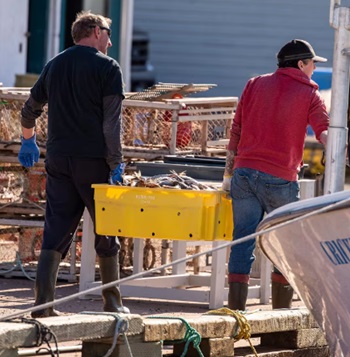 Two years into a moratorium on the East Coast’s spring herring fishery, biologists say the stock isn’t improving. Fisheries and Oceans Canada put a moratorium on fishing for herring in the Gulf of St. Lawrence, and on the mackerel fishery in Atlantic Canada and Quebec, on March 30, 2022. At the time, the department said urgent action had to be taken to give the stocks a chance to recover and to ensure the long-term sustainability and prosperity of East Coast fisheries. DFO biologist Laurie Maynard said that over the last two years of evaluation, the herring stock has plateaued at around 30,000 tonnes, but isn’t showing signs of growth. more, >>click to read<< 14:58
Two years into a moratorium on the East Coast’s spring herring fishery, biologists say the stock isn’t improving. Fisheries and Oceans Canada put a moratorium on fishing for herring in the Gulf of St. Lawrence, and on the mackerel fishery in Atlantic Canada and Quebec, on March 30, 2022. At the time, the department said urgent action had to be taken to give the stocks a chance to recover and to ensure the long-term sustainability and prosperity of East Coast fisheries. DFO biologist Laurie Maynard said that over the last two years of evaluation, the herring stock has plateaued at around 30,000 tonnes, but isn’t showing signs of growth. more, >>click to read<< 14:58
Closure of Eastern Seafood | The end for Matane shrimp?
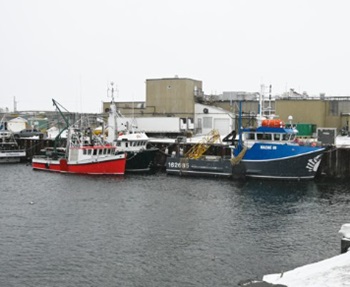 A few days before the start of the fishing season, the oldest shrimp processing plant in Quebec closes its doors. The Danish company Royal Greenland announced on Monday that it was closing down the Eastern Seafood processing plant. The mayor of Matane, Eddy Métivier, speaks of “a total surprise” as the Danish company had recently invested millions to add lobster and crab processing to its activities, in addition to building 71 housing units for its temporary workers. “We are in shock, it’s really a hard blow,” he said in an interview. It is a symbol for Matane. It’s like putting an end to historical fishing traditions. In this sense, too, it is a mourning. more, >>clicck to read<< 14:29
A few days before the start of the fishing season, the oldest shrimp processing plant in Quebec closes its doors. The Danish company Royal Greenland announced on Monday that it was closing down the Eastern Seafood processing plant. The mayor of Matane, Eddy Métivier, speaks of “a total surprise” as the Danish company had recently invested millions to add lobster and crab processing to its activities, in addition to building 71 housing units for its temporary workers. “We are in shock, it’s really a hard blow,” he said in an interview. It is a symbol for Matane. It’s like putting an end to historical fishing traditions. In this sense, too, it is a mourning. more, >>clicck to read<< 14:29
Warming waters send Gaspé’s northern shrimp stock plummeting, spelling trouble for Quebec fishermen
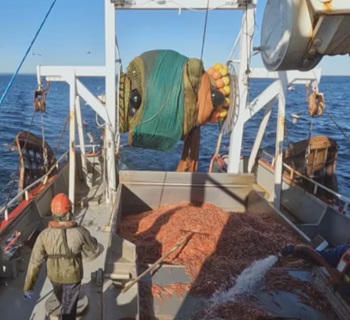 Every year, Fourchette Bleue, which promotes what it calls “under-exploited” marine species in the St. Lawrence for consumption, releases a list of recommended sustainable seafood products for consumers. Toad crabs, oysters and green sea urchins all made the cut this year, but for the first time, the northern shrimp did not. That’s because stocks of the shrimp have taken a major dive in recent years, causing concern in the local fishing industry as Fisheries and Oceans Canada (DFO) floats the idea of potentially closing fisheries in the near future. more, >>click to read<< 07:28
Every year, Fourchette Bleue, which promotes what it calls “under-exploited” marine species in the St. Lawrence for consumption, releases a list of recommended sustainable seafood products for consumers. Toad crabs, oysters and green sea urchins all made the cut this year, but for the first time, the northern shrimp did not. That’s because stocks of the shrimp have taken a major dive in recent years, causing concern in the local fishing industry as Fisheries and Oceans Canada (DFO) floats the idea of potentially closing fisheries in the near future. more, >>click to read<< 07:28
Gulf of St. Lawrence redfish population in decline even before fishery reopens, report finds
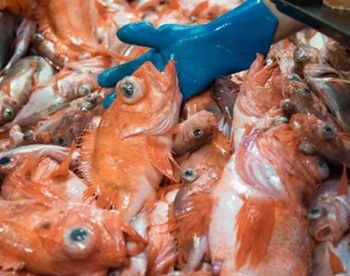 The latest scientific assessment of the redfish population in the Gulf of St. Lawrence has sobering news even as fishing groups in Atlantic Canada and Quebec fight over who will get to catch it: their numbers are rapidly shrinking. “I think we’re at the point that we’re clearly seeing that there’s a limit to this boom,” says federal scientist Caroline Senay, the redfish specialist at the Department of Fisheries and Oceans (DFO). The report comes in advance of DFO’s plan to reopen the fishery later this year after it collapsed in the early 1990s and has been closed since 1995. more, >>click to read<< 09:20
The latest scientific assessment of the redfish population in the Gulf of St. Lawrence has sobering news even as fishing groups in Atlantic Canada and Quebec fight over who will get to catch it: their numbers are rapidly shrinking. “I think we’re at the point that we’re clearly seeing that there’s a limit to this boom,” says federal scientist Caroline Senay, the redfish specialist at the Department of Fisheries and Oceans (DFO). The report comes in advance of DFO’s plan to reopen the fishery later this year after it collapsed in the early 1990s and has been closed since 1995. more, >>click to read<< 09:20
Ottawa revamps redfish allocation in Gulf of St. Lawrence, but N.S. keeps largest share
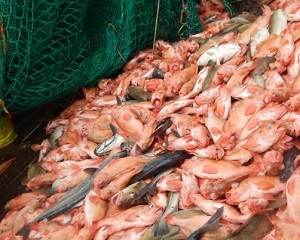 Following months of anticipation and lobbying in Quebec, Newfoundland and Labrador, and Nova Scotia, the federal government has announced how it will allocate fishing access to the redfish population in the Gulf of St. Lawrence. The allocations were announced on Friday by Fisheries Minister Diane Lebouthillier at a news conference in Gaspé, Que. Under the new terms, Nova Scotia will continue to receive the largest portion of the allocation, but it appears the province has received in the past will decline. It is unclear by how much. more, >>click to read<< 15:55
Following months of anticipation and lobbying in Quebec, Newfoundland and Labrador, and Nova Scotia, the federal government has announced how it will allocate fishing access to the redfish population in the Gulf of St. Lawrence. The allocations were announced on Friday by Fisheries Minister Diane Lebouthillier at a news conference in Gaspé, Que. Under the new terms, Nova Scotia will continue to receive the largest portion of the allocation, but it appears the province has received in the past will decline. It is unclear by how much. more, >>click to read<< 15:55
Hundreds of jobs, industry stability at stake in pending Atlantic Canada fishery decision
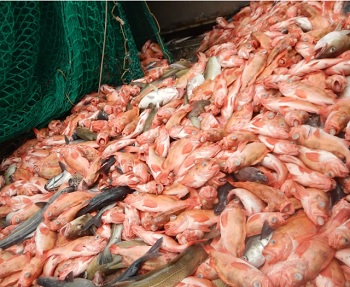 The Trudeau government is poised to allocate fishing access to the massive redfish population in the Gulf of St. Lawrence at the end of the month, a highly anticipated decision generating both dread and hope throughout the industry in Quebec and Atlantic Canada. Nova Scotia, which has the most to lose, is warning Ottawa that “hundreds of jobs” are at stake if it loses its long-standing share of the fishery. Now that the redfish population is estimated to weigh in at a whopping four million metric tonnes, Scotia Harvest and the other Nova Scotia operators are looking nervously at other provinces lobbying for access. Quebec and Newfoundland and Labrador interests, to take one example, are lobbying for a piece of the action to compensate for a drastic reduction in shrimp quota for fleets in their province. more, >>click to read<< 09:06
The Trudeau government is poised to allocate fishing access to the massive redfish population in the Gulf of St. Lawrence at the end of the month, a highly anticipated decision generating both dread and hope throughout the industry in Quebec and Atlantic Canada. Nova Scotia, which has the most to lose, is warning Ottawa that “hundreds of jobs” are at stake if it loses its long-standing share of the fishery. Now that the redfish population is estimated to weigh in at a whopping four million metric tonnes, Scotia Harvest and the other Nova Scotia operators are looking nervously at other provinces lobbying for access. Quebec and Newfoundland and Labrador interests, to take one example, are lobbying for a piece of the action to compensate for a drastic reduction in shrimp quota for fleets in their province. more, >>click to read<< 09:06
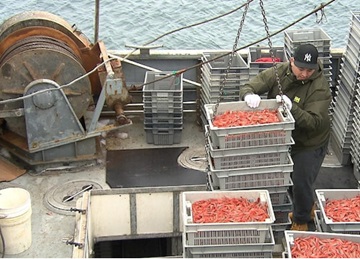
Northern Shrimp fishing: DFO proposals do not pass muster in the industry
Northern shrimp fishermen from Quebec and the Atlantic wholeheartedly reject the new precautionary approach presented by Fisheries and Oceans Canada (DFO) scientists to protect stocks. The fishing associations of Quebec, New Brunswick and Newfoundland and Labrador, industrialists and DFO scientists were gathered during two days for the advisory committee which ended Wednesday in Quebec. Northern shrimp stocks in the Estuary and Gulf of St. Lawrence are not likely to improve, according to Fisheries and Oceans Canada. >>click to read<< 11:47
Shrimp fishing: gloomy outlook and angry fishermen
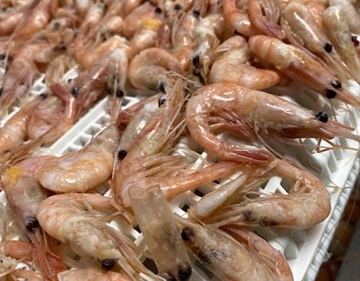 The state of northern shrimp stocks in the estuary and Gulf of St. Lawrence will not improve in the short and medium term and could even continue to deteriorate. It is this grim observation that Fisheries and Oceans Canada shared with the fishermen and processors gathered Tuesday in Quebec for the first day of the shrimp advisory committee of the Estuary and Gulf of Saint -Laurent. DFO biologists have clearly identified redfish predation as one of the main causes of the decline of shrimp stocks in the four fishing areas of the Estuary and Gulf. The warming of the water in the Gulf and the significant drop in oxygen levels also explain the drastic fall in northern shrimp stocks.>>click to read<<14:12
The state of northern shrimp stocks in the estuary and Gulf of St. Lawrence will not improve in the short and medium term and could even continue to deteriorate. It is this grim observation that Fisheries and Oceans Canada shared with the fishermen and processors gathered Tuesday in Quebec for the first day of the shrimp advisory committee of the Estuary and Gulf of Saint -Laurent. DFO biologists have clearly identified redfish predation as one of the main causes of the decline of shrimp stocks in the four fishing areas of the Estuary and Gulf. The warming of the water in the Gulf and the significant drop in oxygen levels also explain the drastic fall in northern shrimp stocks.>>click to read<<14:12
3 victims identified after fishing boat sinks near Quebec’s Lower North Shore
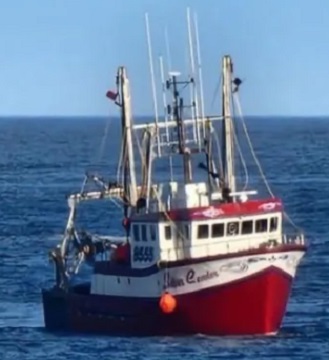 Quebec provincial police have identified the three people who died after a fishing vessel capsized and sank in the Gulf of St. Lawrence near Quebec’s Lower North Shore. Dean Lavallée, 53, Yves Jones, 65, and Damon Etheridge, 36, were all from Blanc-Sablon, Que. The three men were among six people aboard the 18-metre-long Silver Condor sailing near La Tabatière, Que., early Monday morning. Lavallée owned and operated the Silver Condor. The crew left Friday to look for redfish and were on their way back when the ship sank, said Blanc-Sablon Mayor Andrew Etheridge, who is a cousin of Damon Etheridge. “He’s just the kind of guy who puts other people before him,” Etheridge said of his cousin. >>click to read<< 15:47
Quebec provincial police have identified the three people who died after a fishing vessel capsized and sank in the Gulf of St. Lawrence near Quebec’s Lower North Shore. Dean Lavallée, 53, Yves Jones, 65, and Damon Etheridge, 36, were all from Blanc-Sablon, Que. The three men were among six people aboard the 18-metre-long Silver Condor sailing near La Tabatière, Que., early Monday morning. Lavallée owned and operated the Silver Condor. The crew left Friday to look for redfish and were on their way back when the ship sank, said Blanc-Sablon Mayor Andrew Etheridge, who is a cousin of Damon Etheridge. “He’s just the kind of guy who puts other people before him,” Etheridge said of his cousin. >>click to read<< 15:47
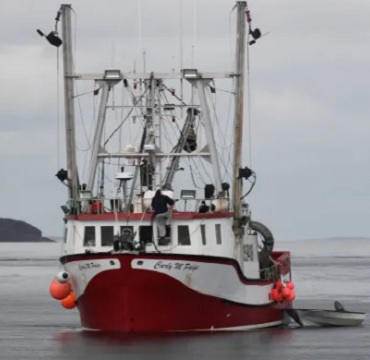
3 dead after boat sinks near Quebec’s Lower North Shore
Three people are dead after a fishing vessel capsized and sank just off La Tabatière, on Quebec’s Lower North Shore, Quebec provincial police say. Three others were taken to hospital in Corner Brook, N.L. The Canadian Coast Guard says the vessel was the F/V Silver Condor, from Blanc-Sablon, Que. A distress signal was received around 2:30 a.m. Monday morning. Six ships from the Department of National Defence and the Canadian Coast Guard took part in the search. The ship went down about 25 kilometres off shore, in the Gulf of St. Lawrence. >>click to read<< 16:40
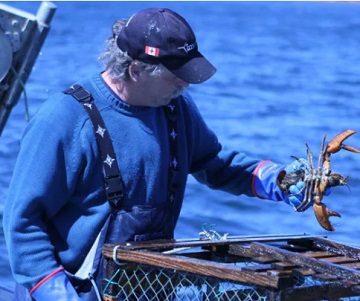
Watching my brother-in-law build his lobster traps by hand taught me the value of old ways
As a kid, I remember lying across the seat of a white rowboat in the hot sun during my summer holidays. In 2006, what seemed like a lifetime later, I was having one of my first quick chats with my future brother-in-law, on the weekend that he and my sister Kathy were getting married. Michael Sullivan is a lobster fisherman. Wearing his preferred black ball cap and sporting a chevron mustache, he catches enough lobster and fish to make a living. He told me about his greatest heartache, that the lobster fishery is a disaster, with catches getting smaller and smaller. But two daughters and 11 years later, things had taken a surprising turn. Michael had been upping his catch, substantially, every year. He had gone back to the “old ways” — building his own wooden traps. Photos, >click to read< 09:01

Canada: Positioning for redfish re-opening
Canada’s commercial fishery for redfish in the Gulf of St. Lawrence has remaind closed since 1995 to allow redfish stocks rebuild to healthy levels. Now the authorities are positioning to re-open the Unit 1 redfish commercial fishery in Atlantic Canada and Quebec in the near future. The announcement has been made by Minister of Fisheries Joyce Murray that in preparation for a pending commercial fishery, the 2023 experimental fishery for Unit 1 redfish will be increased from 2500 to 5000 tonnes. Twenty-four individuals and groups from Quebec, New Brunswick, Prince Edward Island, Nova Scotia and Newfoundland and Labrador have been approved to participate, five of which are Indigenous groups. >click to read< 07:48
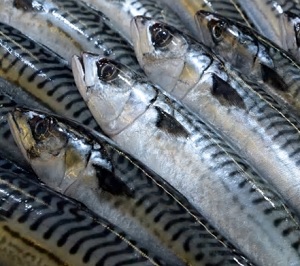
Atlantic mackerel moratorium extended for 2023 season
Fisheries and Oceans Canada has extended the closure of Atlantic mackerel commercial and bait fishing in Atlantic Canada and Quebec for the 2023 season. In a notice to fish harvesters on Wednesday, the federal department said it was continuing the moratorium “to allow the stock to rebuild.” The moratorium has been in place since March 2022. In its notice, Fisheries and Oceans Canada said results of a Canadian stock assessment found Atlantic mackerel “declined further in the critical zone since the last assessment, with spawning stock biomass at its lowest-observed value.” The critical zone means serious harm is occurring. >click to read< 18:36
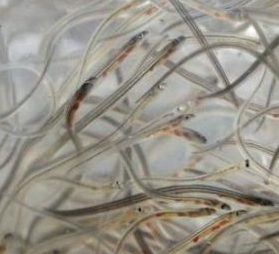
For Atlantic Canada, Fishing Season Brings Yet More Violence
In the early morning dark of April 12, 2023, violence erupted along a Nova Scotia riverbank after a man engaged a woman and a youth in a heated argument. Soon after, seven people arrived. One allegedly assaulted the man with a pipe while another stood nearby wielding a knife and a taser. When the RCMP later arrested two members of the group a short distance away, the officers found two shotguns and a taser. Conflict around elvers is not new, nor is it the only fishery in Atlantic Canada that’s seen so much turmoil. Whether it’s around elvers, lobsters, or something else, “this will continue to play out, and play out, and play out, until the government deals with the issues on the table.” >click to read< 08:05
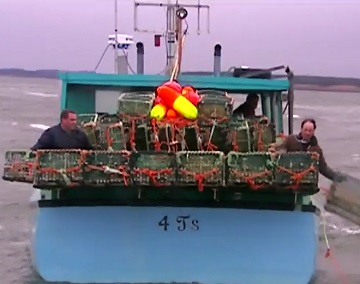
The $200 million lobster season is underway in Quebec
The lobster season is underway in Quebec, starting with Saturday’s launch in the Gaspé Peninsula. “For the past 11 years, lobsters caught near the coasts of the Gaspé and Anticosti Island have been marked with an alphanumeric code, which allows consumers to trace the origin of the lobster on their plates, and even to know the name of the fisherman, the boat and the area in which it was caught,” said the Ministry of Agriculture, Fisheries and Food (MAPAQ) in a news release. Approximately 1,500 fishermen earn their living from lobster fishing in Quebec, according to the most recent data from MAPAQ. Video, >click to read< 14:20

“The market has collapsed.” With crab season on the line, seafood producers’ association digs in its heels on price
Jeff Loder, executive director of the Association of Seafood Producers said Monday the crab market has softened in the past few weeks, and the group will not negotiate a new price with fishermen. “The market has collapsed. Prices need to reflect that,” he said. Loder said each day the industry is delayed, with fishermen in the Maritimes and Quebec already out on the water, the worse it is for everyone. “Snow crab is not selling. There’s a glut in inventory,” said Loder, speaking for the first time since the provincial price-setting panel set a minimum price of $2.20 Cdn per pound for harvesters, who responded with protests and say they can’t afford to fish for that price. “We need raw material to get those plants going, and to have any chance to compete with our competitors in Atlantic Canada, who are all fishing in Quebec, New Brunswick, Nova Scotia and P.E.I. at $2.25 a pound,” Video, >click to read< 16:00
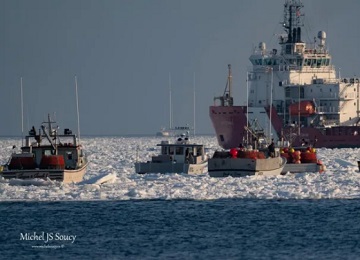
Cape Breton fishermen say ice was a problem because DFO didn’t follow its own policy
Some Cape Breton fishermen say if the Department of Fisheries and Oceans hadn’t opened the Gulf of St. Lawrence snow crab season too early, icebreakers would not have been needed to get boats in and out of Cheticamp harbour. Andrew Bourgeois, president of the Gulf of Nova Scotia Fishermen’s Coalition and a director of the Gulf fleet planning board, said DFO officials usually agree to wait until all the coasts are ice-free, but not this year. “I think if DFO would have followed their protocol, I don’t think there would have been an issue with the ice,” he said. “The protocol says that if there was ice at 20 fathoms or deeper that it shouldn’t open, it wouldn’t open. And they opened it anyways.” >click to read< 13:11

FFAW wants mackerel fishery re-opened
On Thursday, Mar. 30, 2022, the Department of Fisheries and Oceans Canada (DFO) issued a release announcing there would be no directed commercial or bait fishing for southern Gulf spring herring and the closure of the Atlantic mackerel commercial and bait fisheries in Atlantic Canada and Quebec. Now in 2023, Fish, Food, & Allied Workers (FFAW) is calling on the government to reopen the Atlantic mackerel fishery, stating that Newfoundland and Labrador communities shouldn’t bear the burden of this decision. “The biggest problem is that the fishery was closed when it should not have been,” said Courtney Glode, Communications Officer with FFAW. The U.S.A. announced in March that they will proceed with the commercial fishery in 2023, on the East Coast stock shared with Canada; however, an announcement on whether or not the moratorium will be lifted in Canada has not yet been made. >click to read< 10:07
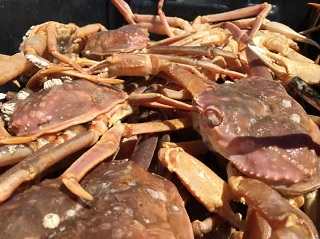
Crab Fishermen stay in boats on the north coast
Unsatisfied with the prices offered to them by the mill owners, most of the crab fishermen in 16 areas on the north shore did not go to sea on Saturday when fishing began in their field. 39 owners of 54 fishing licenses in Area 16 feel hurt by the temporary price of $2.25 per pound offered by the mills and accepted by fishermen in other parts of New Brunswick, Nova Scotia and Quebec. According to these fishermen, the only people in the province to group around the marketing group are not honoring the price formula that allows processors to get more than $2.25 a pound. According to their representative Jean-René Boucher, all factories in the province, including the six located on the north coast, have been issued with a watchword by the Fishing Industry Association not to accept crabs from area 16. >click to read< 10:38
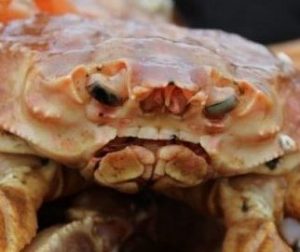
Starvation price for snow crab fishermen
A week into the snow crab fishing season, processors in Quebec, New Brunswick and Nova Scotia on Friday agreed to a temporary dock price of $2.25/lb to $2.50/lb. “There’s more inventory on the market now than we thought, says Jean-Paul Gagne, Director General of the Quebec Fisheries Industry Association (AQIP). For his part, Marc-Olivier des Îles-de-la-Madeleine’s captain, Marco Turbide, promises to put his cages back this spring. “Expecting a price of only two or three dollars a pound doesn’t give ambition, he comments. It’s not fun. For a heavily indebted fisherman like me, we can’t expect to make a profit in 2023 because of the significant loss from crab last year. If we agree to $4/lb, I’m very I’ll be happy!” >click to read< 11:45
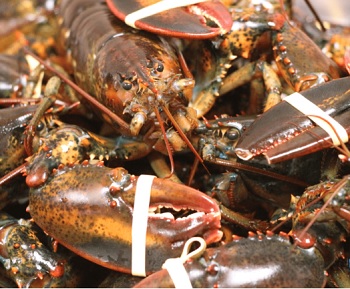
Canadian Lobster Industry Implements Elog JOBEL
Electronic logbooks (Elog) for fisheries are essential for the timely processing and analysis of capture declarations and the sustainable management of Canadian fisheries. Since 2018 in Québec, fishers using JOBEL have demonstrated their fishing activity is compliant with national and international requirements. In the Department of Fisheries and Oceans, fishers, harvesters and scientists now have the information required to evaluate the durability of the Québec lobster fishery. Lobster fishers and harvesters in the Gaspe area now provide the Marine Stewardship Council with accurate information impacting other species during the certification process for their spring fishery. >click to read< 09:41






